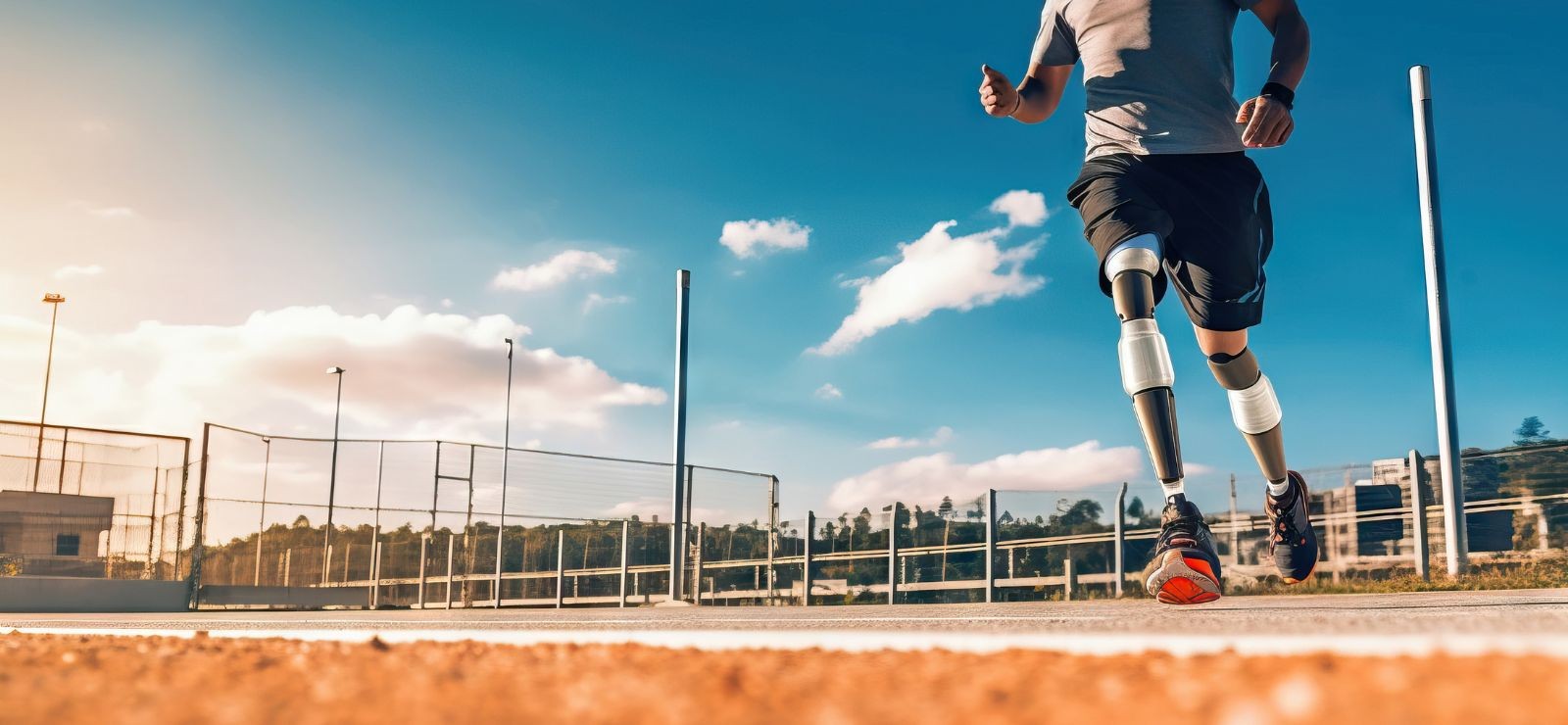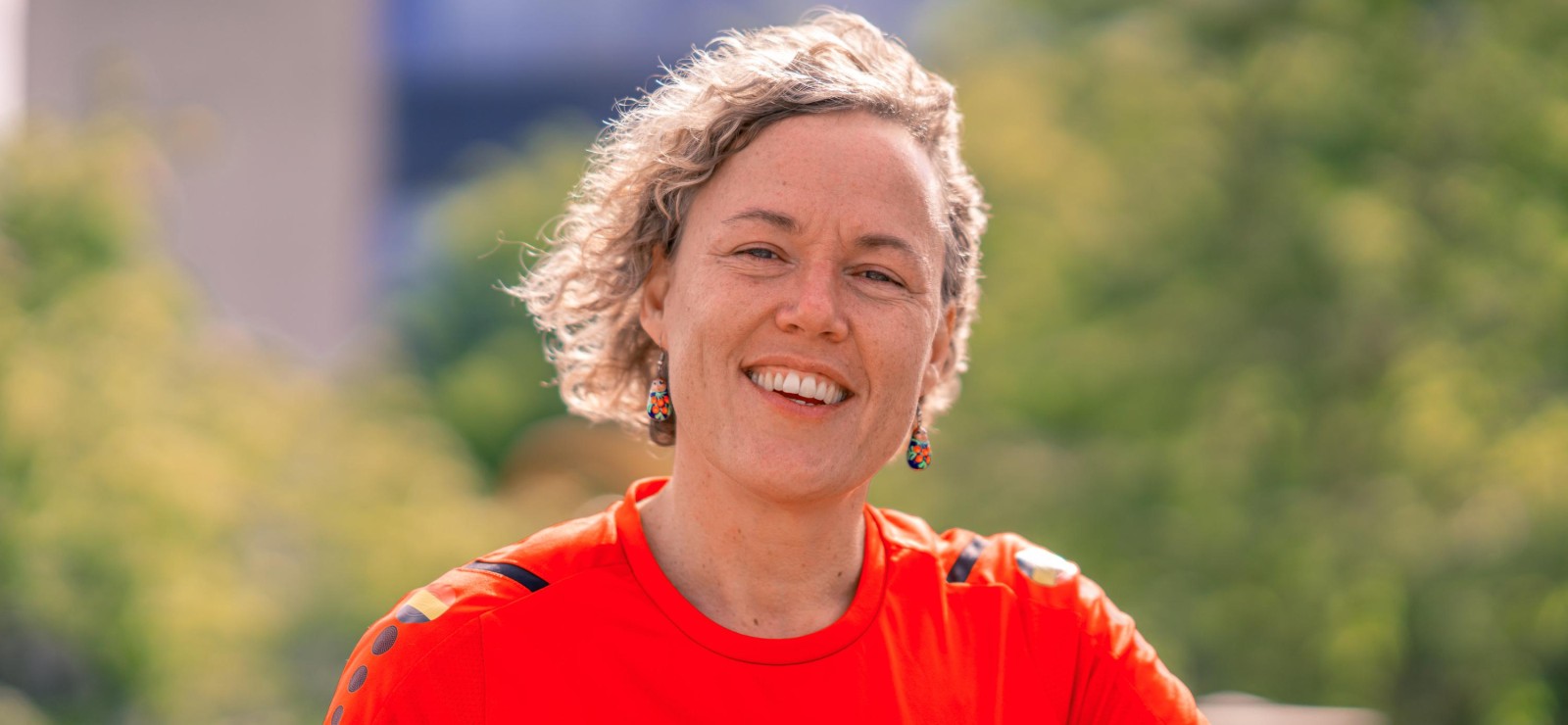Good news for sports fanatics, the summer of sports is not over yet! Our Belgian athletes will soon be competing at the Paralympic Games. Alumna Inge Bru, specialist in physical medicine and rehabilitation at Ghent University Hospital, accompanies them in Paris.
Doctor Inge Bru has a passion for sports. In her education, job, volunteer work and hobby, sport is always the common thread. In addition to her work as a specialist at Ghent University Hospital, she is a volunteer federation physician at G-Sport Vlaanderen, the sports federation for people with a disability or chronic condition.
You are very committed. Why do you think sport is so important?
"I know how much it means to move and exercise healthily. I notice this not only in myself, but also in my children and certainly my patients. The fun, the social contacts. Sport is important for everyone, including people with disabilities.
And it certainly doesn't have to be sport at the highest level. In essence, for all my patients, it is about being able to move healthily again. This has a positive effect on depression, sleep and general well-being. That's why exercise is a cornerstone for patients undergoing rehabilitation."
And you also coach top athletes?
"That's right! The great thing is that I can bring my experience as a rehabilitation doctor to the table. The training sessions are of course the responsibility of the coaches. But if an athlete is having problems, they call me. In consultation with the athlete, coach and physiotherapist, we look at how we can tackle the problem.
That makes for a perfect balance. On the one hand, I work in a department where people are going through a life-changing change and have to completely rebuild their lives. Days with a lot of sadness and anger. Fortunately, I have a powerful team that carries that with them. On the other hand, there are the top athletes who come home with a medal, title or world record. Those are goosebump moments."
How does the coaching of para-athletes differ from other athletes?
"Their medical issues have a big impact. For example, many Paralympians have internal problems. They can't make bowel movements. Or they have wounds because they don't feel a certain area of their body well. That, in turn, is problematic if they have to wear a prosthesis. Or in someone with a spinal cord injury in which the autonomic nervous system is affected, the heart works completely differently.
By the way, para-athletes can't just play competitive sports. They must first go through a medical classification. The International Paralympic Committee recognizes ten types of impairments, such as limitations in strength, joint mobility, limb disorders and movement disorders. Afterwards, the athletes also have to go through the sport-specific classification system.
Every G-sport has a complex classification system based on the functional capabilities of the athletes to make it a fair competition. Within cycling, for example, there are tandems for visually impaired athletes, tricycles for people with a coordination disorder, and so on. That's a big tangle for any sport. And a big responsibility for the classifiers."

Inge Bru: "G-sporters have a bigger backpack that we have to take into account. And tools. That does not alter the fact that they are top athletes who achieve top performances."
Which prejudices about para-athletes would you like to dispel from the world?
"That they are inferior to other athletes. In Dutch, 'G-sport' (para sport) stands for 'gehandicaptensport’ (sport for disabled people). As far as we are concerned, that 'G' can be dropped. They are not inferior to other athletes. They just have a bigger backpack that we have to take into account. And tools. That does not alter the fact that they are top athletes who achieve top performances."
What do you think is the biggest challenge for athletes with disabilities?
"The financial side! For people with disabilities, walking or cycling are elite sports. After an amputation, you need a special prosthesis with a blade costing thousands of euros to walk. Or a handbike, which costs tens of thousands of euros. And those costs are not covered by the government.
If our athletes need adapted equipment to go to the Paralympic Games, they have to look for sponsors. At Ghent University Hospital, we also want to raise awareness about this with initiatives such as Blades on Track."
What do you expect from the Paralympic Games?
"That it will be busy (laughs). It's the first time I'm going, but it's going to be 'wow' anyway. And intense. Something unique to experience."
What does a typical day in Paris look like for you?
"We start the day early with a meeting between the 2 doctors, 2 nurses and 6 physiotherapists of the Belgian team. We look at the daily schedule in function of competitions, training schedules, athletes who need special care. That's an intense collaboration.
By the way, we are also responsible for the staff present. In Paris, we are a bit like the GP team.
At the end of the day, we debrief. We pass on all the information to the International Paralympic Committee. From serious injuries to a cold or earache, we have to register everything."
Are you also going to support live?
"Unfortunately not, there's no time for that. But I'm a very big supporter! We have so many beautiful, Belgian athletes.
I support all of them and I care about them. I often send them a personal whatsapp message when they are at a competition to wish them luck."
Does Belgium have a chance to win medals?
"Definitely! Keep an eye on them all! I'm convinced we'll make it to the podium."
Unique in Flanders: G-sports consultations at Ghent University Hospital
Anyone who wants to exercise but is hindered in doing so is welcome at the sports medicine department at the Ghent University Hospital. The technical lab is particularly equipped, such as equipment for an exercise test with a handbike. In the rehabilitation centre there is also a weekly sports moment in collaboration with a sports coach from G-Sport Vlaanderen to get a taste of all kinds of sports, adapted to your abilities. This way, everyone can move and exercise healthily!
Inge Bru is:
- specialist in physical medicine and rehabilitation in the rehabilitation centre and in the centre for sports medicine of the Ghent University Hospital (UZ Gent)
- Voluntarily associated with G-Sport Vlaanderen as a federation doctor
- Official classifier for paracycling
- Played basketball for 25 years and passed on the basketball bug to her two children
Read also
Ghent University professor collaborated remarkable opening ceremony of Olympic Games: "The pressure was on"
No traditional opening for the Olympic Games in Paris, but a spectacular fleet of 95 boats on the Seine with 10,500 athletes on board. It was a historic moment and a technical feat. The research group of Evert Lataire, Ghent University professor of Ships and Marine Technology, trained the captains for this unique boat parade.
Ghent University researchers support Olympic track cyclists: optimal performance thanks to sensors and AI
If the Belgian track cyclists win a medal at the upcoming Olympic Games, it will not only be the result of top performances but also of top research. In the Flemish Cycling Centre Eddy Merckx, a stone's throw from the Watersportbaan, a group of researchers from the IDLab of UGent-imec supports our track cyclists with the help of artificial intelligence (AI).
Ghent-based DoCoLab helps to control doping at the Olympic Games
The doping controls at the upcoming Olympic and Paralympic Games will again have a Ghent connection. The doping control lab of Ghent University, DoCoLab for short, is sending a team of researchers to Paris to help check many thousands of samples. Peter Van Eenoo, head of the lab, professor and cycling fan, will be part of that team: "We won't have lots of free time, but I do hope to catch some of the cycling (laughs)."
Why is doping not allowed at the Olympics in Tokyo?
The Doping Control Lab at Ghent University is an international authority in the field of doping research. The lab will be sending a delegation to the Olympics in Tokyo this year, just like it did during previous editions. But why is this necessary? Why aren’t athletes free to choose what they do with their own body? DoCoLab’s manager, prof. Peter Van Eenoo, sheds some light on these questions.




